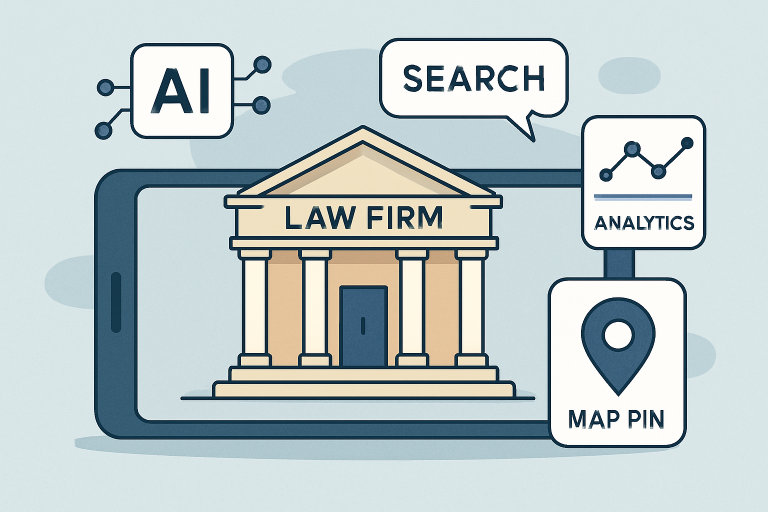Table of Contents
- Rethinking SEO Amid Growing Digital Trends
- Integrating AI and Automation in Legal SEO
- Technical SEO: Keeping Up With Web Standards
- Prioritizing Local SEO for Law Firms
- Crafting Content That Stands Out
- User Experience as a Ranking Factor
- Leveraging Data and Analytics for Smart Decisions
- Tips for Sustaining SEO Success Beyond 2025
- Conclusion
Rethinking SEO Amid Growing Digital Trends
The digital landscape for legal services is evolving rapidly, pushing law firms to adopt new approaches for maintaining and improving visibility online. With search engines getting smarter and user behaviors becoming more nuanced, it’s crucial to understand that SEO is no longer just about putting the right keywords on a page. Working with a trusted law firm SEO agency can make a critical difference in strategizing for these changes and anticipating the future of online legal search.
Recent studies indicate that over 96% of people in need of legal advice start their search online, often using mobile devices or voice-powered assistants. This shift means your law firm’s website needs to address the queries and habits of these modern clients. To stay ahead, consider how AI-driven search engines are adapting to user intent and natural language, making it essential for law firms to anticipate and react proactively to these trends.
Integrating AI and Automation in Legal SEO
Artificial intelligence is beginning to upend traditional marketing and SEO models in the legal sector. AI-powered tools can now analyze search patterns, suggest content improvements, and automate technical audits, helping firms respond dynamically to evolving ranking factors. Combining automation with human expertise streamlines site updates and ensures that marketing teams can focus on strategy rather than repetitive tasks. Firms that plan for AI integration now will have a significant head start as the technology matures by 2025.
Automation also plays a key role in maintaining rigorous SEO hygiene—automating tasks such as backlink monitoring or local listing updates reduces human error and saves time. Routine, AI-driven audits for your law firm’s website can identify threats, such as algorithm changes or technical issues, before they impact your rankings. Early adopters of these technologies can scale their marketing efforts without sacrificing quality or compliance.

Technical SEO: Keeping Up With Web Standards
Technical SEO is increasingly vital as search engines prioritize web performance and security in their algorithms. Essential elements like fast loading times, mobile compatibility, SSL certificates, and structured data directly impact rankings and user trust. Google’s Core Web Vitals rollout significantly emphasizes these performance metrics, penalizing sites that offer a poor experience. Law firms should regularly run comprehensive technical audits, checking for broken links, slow-loading pages, and outdated plugins. Structured data—metadata that helps search engines understand your content—becomes more important with rich snippet results on the rise. Meeting modern web standards secures higher visibility and positions your firm as trustworthy and professional.
Prioritizing Local SEO for Law Firms
The vast majority of legal searches have local intent, as prospective clients seek legal counsel within their immediate community. Optimizing your Google Business Profile should be a top priority—accurate business information, up-to-date office hours, and engaging photos foster trust and help generate leads. Building a robust profile of citations across reputable legal and business directories further boosts your map rankings. Consistent NAP information (Name, Address, Phone number) across all platforms is critical to avoid confusing search engines and potential clients. As hyperlocal targeting becomes more precise in the coming years, firms that invest early in local SEO will benefit from sustained organic traffic and market dominance within their regions.
Crafting Content That Stands Out
High-impact content remains the cornerstone of any strong SEO strategy. Potential clients rely on law firm websites for clear, accessible guidance on legal matters. Successful legal content for 2025 must strike a balance between detail and readability: provide authoritative yet approachable information, using multimedia elements like FAQs, infographics, or interactive tools where relevant. Google’s helpful content guidelines highlight the need for original, well-researched resources that directly address the needs of your audience. Regularly update practice area pages and publish blog posts that answer common questions or explain new legal developments. This not only builds your firm’s authority but also encourages longer time-on-site and more engagement.
User Experience as a Ranking Factor
User experience (UX) is now a central ranking factor, with search engines monitoring how visitors interact with your site. Fast load times, mobile-optimized layouts, and intuitive navigation all contribute to better engagement and higher rankings. Even visual clarity—appropriate text size, contrasting colors, and logical site flow—influences both your SEO metrics and conversion rates. Solicit feedback from clients and prospects to identify pain points or areas for improvement. Tools such as heatmaps and user session recordings can reveal common frustrations or navigational dead ends. The more helpful and seamless the experience, the more likely visitors are to convert into clients—and share positive reviews on your local listings.
Leveraging Data and Analytics for Smart Decisions
Data is indispensable for refining and sustaining your SEO strategy. Solutions like Google Analytics, Search Console, and advanced reporting software help law firms track which channels drive the most leads, which pages retain visitors, and what keywords are converting. Routine analysis of metrics such as bounce rates, conversion rates, and organic visibility is crucial for diagnosing issues and identifying new growth opportunities. Develop internal dashboards and reporting routines so that your team, partners, or marketing professionals can make agile, data-backed decisions. Consulting with digital marketing analysts or specialized agencies can provide a competitive edge as the search landscape grows more complex.
Tips for Sustaining SEO Success Beyond 2025
- Keep your site content fresh with a regular update schedule for blogs, services, and FAQs.
- Stay informed about search engine updates and algorithm shifts to adapt strategies proactively.
- Foster high-quality relationships online through digital PR and earn reputable backlinks.
- Experiment with emerging technologies and marketing tools early to stay ahead of competitors.
The rapid evolution of SEO demands that law firms become lifelong learners, always ready to adapt and collaborate with experts. By embracing forward-thinking strategies and leveraging the support of a skilled SEO agency, firms can ensure they remain visible, credible, and competitive in the digital age.
Conclusion
The future of legal SEO lies in adaptability, foresight, and a willingness to embrace innovation. As technology continues to evolve—whether through AI, automation, or new ranking factors—law firms must go beyond traditional tactics to remain visible and relevant. Local optimization, technical excellence, compelling content, and seamless user experiences form the foundation of a strong digital presence. By harnessing data-driven insights and staying agile in response to industry shifts, firms can position themselves as trusted resources for clients navigating legal challenges. Those investing in long-term SEO strategies today will maintain competitiveness and thrive in a digital-first marketplace well beyond 2025.

